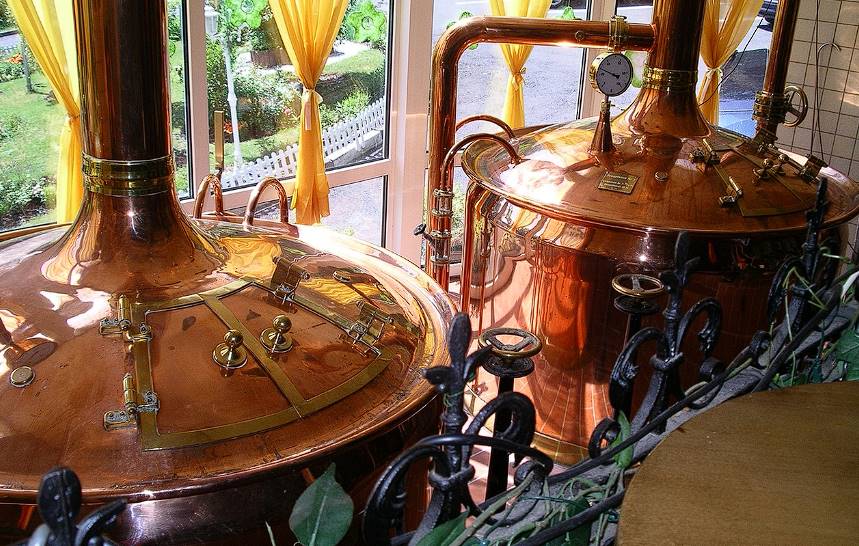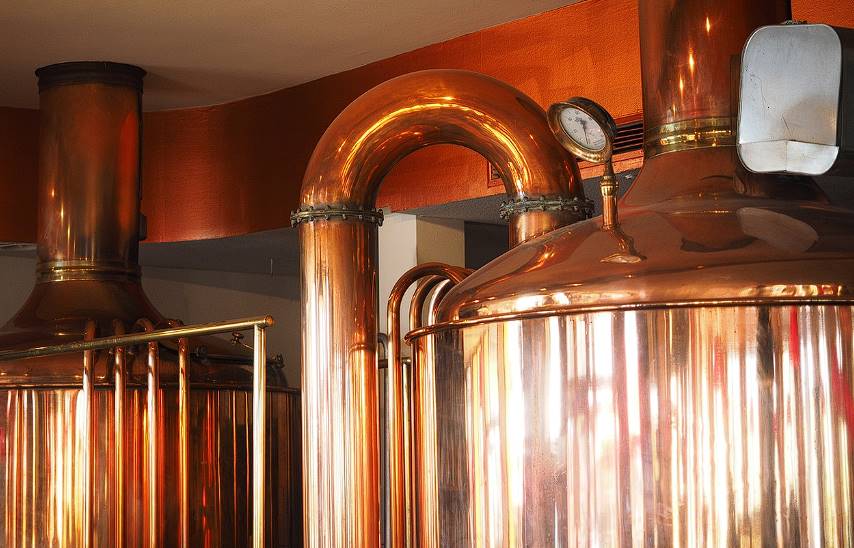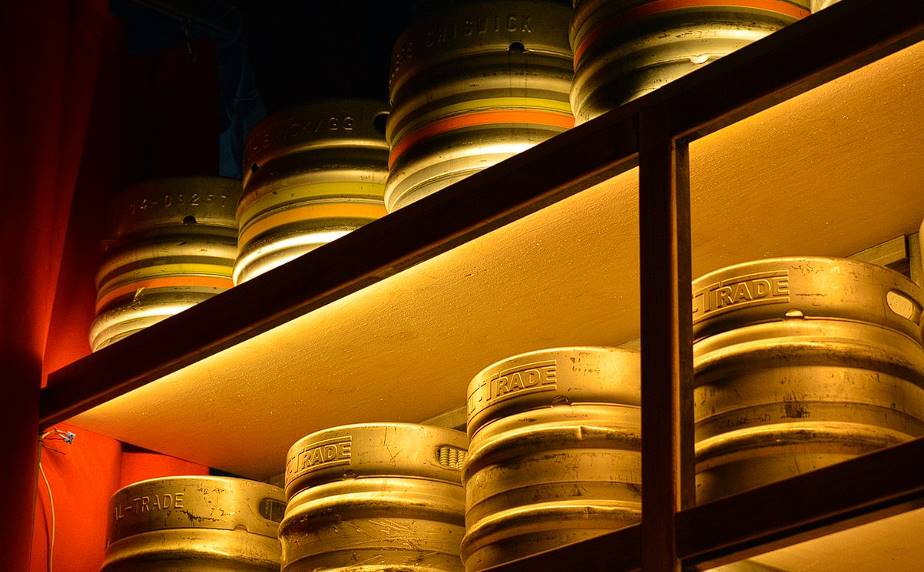Most beer drinkers know that barley, hops, and yeast are the three basic components of beer. Water makes up around 90% of the total in practically any beer, yet it's easy to forget about it amidst the nuanced discussions of the first three ingredients.
Both huge corporations and smaller, more nimble craft breweries have been vocal about the need for water quality control systems specific to beer production. Good beer can only be made once pure water is available. The better the water utilised, the more refined the flavour and quality of the finished product.
Are you looking for a brewery or distillery that is professional and affordable? At Tar Barrel, we pride ourselves on being the most affordable and professional Mornington brewery and distillery in Victoria. Before the advent of flexible modern brewing techniques, brewers were limited in their selection of beers by the available water sources.
Beer's Water Supply Is Crucial to Maintaining Flavour Consistency
Since water is the basis of many different substances, brewers must actively seek high-quality water sources. An analysis of the influence of brewing water minerals on beer flavour profiles found interesting results. Therefore, the brewing water has the largest impact on the final product. After all, between 90 and 95 percent of a standard beer's composition is water, just like the human body.
The use of water in the brewing process is being questioned. Some brewers claim that the water quality used in the brewing process is more important than hops, grains, or barley. These brewers believe that using purified drinking water or high-quality mineral spring water makes a difference in creating a beer with a harmonious balance of flavours.
However, many in the brewing industry argue that you don't need any special water to produce high-quality beer everywhere. The most fundamental water composition factors are relevant here: RO, alkalinity, mineral content, and acidity levels. According to these brewers, one should be able to manufacture exceptional-tasting beer even with simple municipal tap water or natural spring variety water, as long as the fundamental qualities are adjusted correctly, independent of the resources available.
The Ideal Water Composition for Beer Brewing
Filtered municipal or bottled water sufficiently adjusted to provide a balanced mineral profile is typically the best for brewing beer. Therefore, calcium, magnesium, sulphate, and calcium chloride are, scientifically speaking, the most significant minerals to consider while brewing the perfect beer.
A study indicated that lager beers with carbonate levels above 200 parts per million had an unpleasant bitterness. Therefore, reverse osmosis (RO) water is preferred when seeking brewing water specifically for beer. Brewers will have a blank slate to paint their desired flavours and styles if they use this water.
According to studies, geological variables play a major role in determining the presence of minerals in the water, affecting the pH level. These minerals greatly influence the taste, clarity, and head retention of beer. Therefore, the right mineral balance is the sole variable that needs to be adjusted for a smoother, longer-lasting beer. For example, if these ingredients are quite right, you will only have a good beer.
Only water collected from a natural source, like a spring, the ground, or rain, may be used in the brewing process. However, beginners shouldn't try this because identifying the minerals can be tricky.
In comparison, most seasoned brewers opt for reverse osmosis water or local water sources based on the beer's taste.
Steps in the Brewing Procedure
- Mashing
- Boiling
- Fermentation
- Bottling
- Filtering
Mashing, also known as "hot water steeping," is the first step in the brewing process in a brewery. The first step is crushing the barley and soaking it in warm, filtered water. It creates a thick mixture and stimulates enzymes in the process. The resulting enzymes convert the grains' soluble starches into wort, which may then be fermented. The wart contains protein and carbohydrates, which affect the beer's mouthfeel, body, and malt.
When complete, the wort is 80% water. When boiling, the flavour improves. Again, water is crucial in ensuring optimal performance and beer flavour. Therefore, water is the foundation of the entire (brewing) process.
Water's Three Components and How They Affect Beer Flavour
The beer's flavour is affected by a number of factors, including the water's mineral concentration, pH, and alkalinity.
- The yeast's fermentation process is influenced by the water's hardness and mineral content, which both contribute to flavour.
- The water's pH encourages the activity of enzymes in the mash and stimulates yeast growth during fermentation.
- The water's alkalinity functions as a buffer, keeping the pH stable and eliminating any bacteria that may have been introduced during the brewing process. By avoiding astringency and eliminating superfluous tannins, this process also protects the beer's great flavour.
Beers with a high hop content, like pale lagers and ales, benefit from the low pH of soft water. However, stouts and other extremely robust dark beers benefit from using hard water. That's because the dark-roasted malts help reduce the alkalinity and pH of hard water. Some brewers preferred to set up shop near hard water sources in order to produce darker beers, while others preferred to do the opposite in order to produce lighter ales and lagers.
Knowing and managing the water quality used in brewing is crucial to creating the best beer possible and adds a personal touch to the brewing process. In order to extract fermentable sugars from the grain, a mashing mechanism is employed, and the quality of the water used in this process affects the end result significantly.
Depending on the brewing process, Eighty percent of the volume may be made up of water. Any pollutants in the water can later become part of the final product when boiling spice and hops are added, affecting the beer's flavour, aroma, taste, and overall quality. How beer water quality is affected and how disinfectants can be used to remove this sort of out-of-the-ordinary adulteration are all discussed in detail here.
The acidity of sour and fruit beers, like red wines, must be significantly lower, about 3.5 to 4.5. Since pH affects both starch conversion and sugar extraction during mashing and sparging, maintaining a constant value throughout the process is often vital. Hop flavour, bitterness, and sweetness may all be regulated by pH during fermentation. A beer's astringent flavour comes from the tannins extracted when the mash's pH is raised.
Use the appropriate amount of baking soda to adjust the pH level of your mash if it is too low. Careful use of these hints and techniques during home brewing will result in a beer that rivals commercial offerings in quality.
Water hardness plays a major role in determining mash efficiency in the brewing process. This is because the amount of dissolved calcium and magnesium salts in the water is directly correlated with the hardness of the water. These two ingredients are binding agents to improve wort quality by extracting more soluble material from grain during mashing. Finding the sweet spot between hard and soft water allows maximum extraction during mashing without sacrificing flavour in the finished product, but too much salt might cause an unpleasant imbalance.
Brewers should evaluate beer water for factors beyond hardness, including alkalinity or pH levels, mineral content, iron concentration, sulphate/chloride ratio, temperature stability, and yeast health. Beer's optimal flavours are affected by the solution's pH, which measures how acidic or basic it is.
The chemistry of the mash relies heavily on the mineral content, which influences the fermentation rate and contributes flavour. Conversely, a lack of something or excess in the brewing water can negatively affect the beer's flavour, character, body, and head retention. Therefore, the only way to strike the ideal equilibrium is to maximise what you have.
These three components are intertwined and work together to give the beer its final flavour and colour.
Conclusion
There is some disagreement over how crucial water is to the brewing process. Some brewers insist that RO, alkalinity, mineral content, and acidity levels are the most crucial aspects of water composition when achieving a balanced flavour profile, while others insist that using filtered drinking water or high-quality mineral spring water makes no difference.
Beer is best brewed using filtered municipal or bottled water because of its balanced mineral profile. The main takeaways from this text are that the most crucial elements for creating the perfect beer are calcium, magnesium, sulphate, and calcium chloride. Due to the importance of geological aspects in determining the presence of minerals in the water, reverse osmosis (RO) water is favoured when looking for brewing water specifically for beer.
The brewing process includes the procedures of mashing, boiling, fermentation, bottling, and filtering. The mineral content, pH, and alkalinity of the water all play a role in shaping the beer's flavour. The higher the pH, the more active the mash enzymes will be, and the more yeast will grow during fermentation. The alkalinity acts as a buffer to maintain a consistent pH and kill any bacteria that may have been present before, during, or after the brewing process. Brewing using high-quality water is crucial for producing delicious beer.
Pollutants in the water can alter the beer's flavour, aroma, taste, and general quality. The acidity of sour and fruit beers shouldn't be higher than 3.5 to 4.5, and the beer's pH should remain stable. Hop taste, bitterness, and sweetness are sensitive to changes in mash pH. The degree to which water is hard affects how effective the mash is. In addition to hardness, brewers should consider the beer water's alkalinity, mineral content, iron concentration, sulphate/chloride ratio, temperature stability, and yeast health. These three elements combine to form the ultimate aroma, flavour, and appearance of the beer.
Content Summary
- Water makes up around 90% of the total in practically any beer, yet it’s easy to forget about it amidst the nuanced discussions of the other ingredients.
- Good beer can only be made once pure water is available. The better the water utilised, the more refined the flavour and quality of the finished product.
- Both huge corporations and smaller, more nimble craft breweries have been vocal about the need for water quality control systems specific to beer production.
- The brewing water has the largest impact on the final product. After all, between 90 and 95 per cent of a standard beer’s composition is water, just like the human body.
- Some brewers claim that the water quality used in the brewing process is more important than hops, grains, or barley. These brewers believe that using purified drinking water or high-quality mineral spring water makes a difference in creating a beer with a harmonious balance of flavours.
- However, many in the brewing industry argue that you don’t need any special water to produce high-quality beer everywhere. The most fundamental water composition factors are relevant here: RO, alkalinity, mineral content, and acidity levels.
- Filtered municipal or bottled water sufficiently adjusted to provide a balanced mineral profile is typically the best for brewing beer. Therefore, calcium, magnesium, sulphate, and calcium chloride are, scientifically speaking, the most significant minerals to consider while brewing the perfect beer.
- Reverse osmosis (RO) water is preferred when seeking brewing water specifically for beer. Brewers will have a blank slate to paint their desired flavours and styles if they use this water.
- Geological variables play a major role in determining the presence of minerals in the water, affecting the pH level. These minerals greatly influence the taste, clarity, and head retention of beer.
- The right mineral balance is the sole variable that needs to be adjusted for a smoother, longer-lasting beer. For example, if these ingredients are quite right, you will only have a good beer.
- Only water collected from a natural source, like a spring, the ground, or rain, may be used in the brewing process. However, beginners shouldn’t try this because identifying the minerals can be tricky.
- In comparison, most seasoned brewers opt for reverse osmosis water or local water sources based on the beer’s taste.
- Mashing, also known as “hot water steeping,” is the first step in the brewing process in a brewery. The first step is crushing the barley and soaking it in warm, filtered water. It creates a thick mixture and stimulates enzymes in the process.
- The resulting enzymes convert the grains’ soluble starches into wort, which may then be fermented. The wart contains protein and carbohydrates, which affect the beer’s mouthfeel, body, and malt.
- When complete, the wort is 80% water. When boiling, the flavour improves. Again, water is crucial in ensuring optimal performance and beer flavour. Therefore, water is the foundation of the entire (brewing) process.
- The beer’s flavour is affected by a number of factors, including the water’s mineral concentration, pH, and alkalinity.
- The yeast’s fermentation process is influenced by the water’s hardness and mineral content, which both contribute to flavour.
- The water’s pH encourages the activity of enzymes in the mash and stimulates yeast growth during fermentation.
- The water’s alkalinity functions as a buffer, keeping the pH stable and eliminating any bacteria that may have been introduced during the brewing process. By avoiding astringency and eliminating superfluous tannins, this process also protects the beer’s great flavour.
- Beers with a high hop content, like pale lagers and ales, benefit from the low pH of soft water. However, stouts and other extremely robust dark beers benefit from using hard water. That’s because the dark-roasted malts help reduce the alkalinity and pH of hard water.
- Knowing and managing the water quality used in brewing is crucial to creating the best beer possible and adds a personal touch to the brewing process.
- Any pollutants in the water can later become part of the final product when boiling spice and hops are added, affecting the beer’s flavour, aroma, taste, and overall quality.
- The acidity of sour and fruit beers, like red wines, must be significantly lower, about 3.5 to 4.5. Since pH affects both starch conversion and sugar extraction during mashing and sparging, maintaining a constant value throughout the process is often vital.
- Hop flavour, bitterness, and sweetness may all be regulated by pH during fermentation. A beer’s astringent flavour comes from the tannins extracted when the mash’s pH is raised.
- Use the appropriate amount of baking soda to adjust the pH level of your mash if it is too low. Careful use of these hints and techniques during home brewing will result in a beer that rivals commercial offerings in quality.
- Water hardness plays a major role in determining mash efficiency in the brewing process. This is because the amount of dissolved calcium and magnesium salts in the water is directly correlated with the hardness of the water.
- These two ingredients are binding agents to improve wort quality by extracting more soluble material from grain during mashing. Finding the sweet spot between hard and soft water allows maximum extraction during mashing without sacrificing flavour in the finished product, but too much salt might cause an unpleasant imbalance.
- Brewers should evaluate beer water for factors beyond hardness, including alkalinity or pH levels, mineral content, iron concentration, sulphate/chloride ratio, temperature stability, and yeast health.
- The chemistry of the mash relies heavily on the mineral content, which influences the fermentation rate and contributes flavour. Conversely, a lack of something or excess in the brewing water can negatively affect the beer’s flavour, character, body, and head retention.
- These three components are intertwined and work together to give the beer its final flavour and colour.
Frequently Asked Questions
To maintain the flavour of your beer, store it in a cool, dark place, away from light and heat. Keep it in a sealed container and avoid exposing it to air as much as possible. Also, try to consume it within its recommended shelf life to prevent it from going stale.
Ageing beer can enhance its flavour, but not all types of beer are suitable for ageing. High-alcohol, dark, and strong-flavoured beers, such as stouts, barleywines, and Belgian ales, can benefit from ageing if stored properly. However, most beers, particularly lighter and hop-forward ones, are best consumed fresh.
Signs that your beer has gone bad include a sour or vinegar-like taste, a musty or mouldy smell, cloudiness or sediment in the bottle, and a lack of carbonation. If in doubt, it's best to err on the side of caution and discard the beer.
Yes, beer can go bad and lose its flavour if not stored properly or consumed within its recommended shelf life. Exposure to light, heat, and air can cause oxidation, resulting in a stale and skunky taste.
Yes, the choice of glassware can impact the flavour perception of beer. Different beer styles have specific glassware designed to enhance their aroma, visual presentation, and overall drinking experience. Utilising the appropriate glassware can help concentrate aromas, maintain proper carbonation, and showcase the beer's characteristics.


